Is the Lottery Fair?

The lottery is a method of raising money by selling tickets to the public for a chance to win a prize. Traditionally, the winner is determined by drawing lots. However, more modern lotteries use random selection methods such as a computer program to determine the winner. Despite their widespread popularity, the lottery is controversial in some states because it is a form of gambling that promotes addictive behavior and targets poorer individuals, among other criticisms. The state’s desire to raise revenues is said to conflict with its duty to protect the welfare of its citizens.
In addition to the traditional lottery games that involve purchasing tickets for a drawing at a future date, many states now offer a variety of instant games, such as scratch-off tickets. These instant games often feature lower prizes but more favorable odds of winning. Many critics claim that these new games exacerbate existing alleged negative effects of the lottery, including its targeting of poorer individuals, its promotion of addictive gambling behaviors, and its role as a major regressive tax on low-income communities.
Regardless of their popularity, the lottery has a long and troubled history. In colonial America, the first lotteries raised funds for the establishment of English colonies, as well as for other purposes, such as paving streets and constructing wharves. Benjamin Franklin sponsored a lottery to fund cannons for the defense of Philadelphia against the British, and George Washington attempted a lottery to finance a road across the Blue Ridge Mountains.
People have always been drawn to the idea of winning. In fact, the Bible references the earliest forms of lotteries. Moses instructed the Israelites to draw lots to divide up land and wealth, and Roman emperors used lottery-like games as part of their public administration. In modern times, the lottery has become a popular way for governments to raise money for a wide range of projects. But is the lottery fair?
The word “lottery” is derived from the Latin loterie, meaning to distribute or give out. The term is also related to Old Dutch loten, a verb for “to throw” or “to choose by lot.” Modern lottery games are similar to the ones used in ancient times, although there are some differences. In some cases, players must pay a fee for a ticket in order to participate.
The success of any lottery depends on the quality of its design and operation. A good lottery will have an appropriate number of tickets on which to draw, a randomized method for awarding prizes, and a reasonable amount of time for players to submit entries. It will also be easy to verify the results of the draw. In addition, the lottery must have a system for compensating winners and ensuring their compliance with all regulations. It is important to keep these factors in mind when designing a lottery, as they can greatly impact the odds of winning. In short, a good lottery will be a fair and effective tool for raising money for public works.